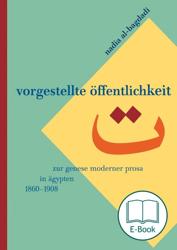This socio-literary study examines the relationship between processes of modernisation and reform, and new literary genres produced in Egypt of the second half of the 19th century. How did heterogenous modern literary forms emerge in this particular environment, and what were the underlying motivations of the new authors? Literature is regarded here as a specific sphere of knowledge and representation, facilitating in its modes of reflection novel individual and societal patterns of experience. If urbanity played a special role as constitutive element of narrative prose, ideas about new forms of public sphere and public opinion also played their role. The new means of text production, finally, attested to the recession of the auratic perception of a text.
This socio-literary study examines the relationship between processes of modernisation and reform, and new literary genres produced in Egypt of the second half of the 19th century. How did heterogenous modern literary forms emerge in this particular environment, and what were the underlying motivations of the new authors? Literature is regarded here as a specific sphere of knowledge and representation, facilitating in its modes of reflection novel individual and societal patterns of experience. If urbanity played a special role as constitutive element of narrative prose, ideas about new forms of public sphere and public opinion also played their role. The new means of text production, finally, attested to the recession of the auratic perception of a text.
Nadia Al-Bagdadi studierte Islamwissenschaft in Berlin. Sie verbrachte längere Forschungsaufenthalte in Ägypten, Libanon und Syrien. Lehrtätigkeit übte sie u.a. in Berlin (Freie Universität), Ithaca (Aurora College) und Beirut (American University of Beirut) aus. Zur Zeit ist sie Professorin an der Central European University, Budapest. Seit 2004 Mitgründerin und Präsidentin von „al-Dhakira al-Arabiyya - Centre for Private Arab Papers“ (Beirut). Ihre Forschungsschwerpunkte umfassen sozio-kulturelle und religiöse Transformationsprozesse in der arabischen Welt des 19. Jahrhundert sowie überfassendere Fragen vergleichender kultureller Praxis und Praktiken im Islam.
Literatures in Context is a peer-reviewed book series devoted to Near Eastern and North African literatures. The editors want the title of the series to be understood programmatically. They presuppose a concept of world literature that includes Near Eastern and North African literatures. What is more, they assume that literatures are in many ways marked by intertextuality, that they constitute readings of extremely diverse earlier texts, and that they are posited within a field of tensions, much broader than their respective national language. For the earlier eras of Near Eastern and North African literatures, this field of tensions geographically covers the regions of the Southern and Eastern Mediterranean and Asia Minor. In modern times, it has become a space of interaction that has long since included “global” Western literatures (and realities). This does not imply that the modern Near Eastern and North African literatures have severed themselves from their predecessors. Instead it is precisely the tension between different sets of references in modern Near Eastern and North African literatures, or their “local historical context”, which is a great part of their attraction, that remains a crucial field of research for the modern scholar.


 Preface
Preface